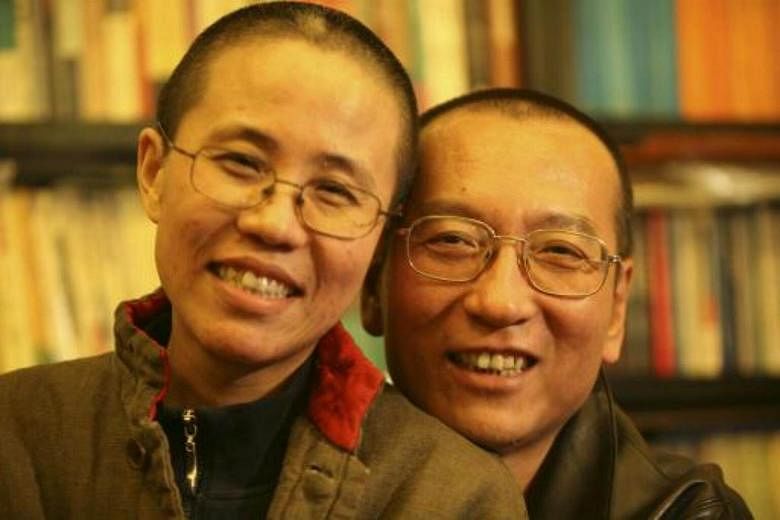BEIJING • As China's most famous political prisoner Liu Xiaobo lay dying under police guard, he struggled to finish what was probably his last written work. It was not a political statement, but a sometimes playful, sometimes darkly cryptic, tribute to his wife, Liu Xia, an artist and poet who endured house arrest while her husband served an 11-year prison sentence.
"Love as intense as ice, love as remote as blackness," reads one of the handwritten notes Dr Liu wrote in a hospital in north-eastern Shenyang city before he died of liver cancer last Thursday.
"My praise is perhaps an unforgivable poison," he wrote in the brief and sometimes fragmentary tribute to his wife and her art.
Dr Liu's notes were for the preface of an unpublished collection of his wife's photographs provisionally titled "Accompanying Liu Xiaobo". His notes and the photo collection were shared by a Chinese editor who was a friend of theirs and who had helped compile the book. The editor said Dr Liu had made contact late last month and that people close to him later passed on pictures of his notes from the hospital. The editor asked to remain anonymous, citing fear of repercussions.
Dr Liu, who died at age 61, will remain best known as an obdurate dissident who was awarded the Nobel Peace Prize in 2010 while in prison. He was sentenced in 2009, the year after he helped issue a petition calling for democratic change that led to his arrest.
But his last known writing shows how Dr Liu, whose fame began in the 1980s as a quarrelsome literary academic, remained an artistic soul who drew inspiration from his wife and feared for her future. She has lived under constant police watch since he was awarded the Nobel Peace Prize.
Madam Liu Xia's book may include a few poems that speak of her bond with her husband, and of the isolation and anguish she endured while he was in jail, said the editor, who is seeking a foreign publisher.
Her black-and-white photographs include many images of dolls with pained expressions in nightmarish settings. Some of the images have been exhibited before. One shows a doll locked in a bird cage, holding a flickering candle. Another shows a doll whose arms and legs are tied with strips of cloth.
In one poem dedicated to Dr Liu, which was shared by the editor, she wrote: "I know sooner or later the day will come/ When you'll leave me/ And walk alone down the road of darkness."
Madam Liu, 56, has found her isolation hard to take. In a rare interview in 2012, when reporters with the Associated Press managed to evade guards outside her apartment in Beijing, she said: "Kafka could not have written anything more absurd."
A friend of the couple, writer Wu Yangwei, said: "That's what we're worried about. Now he's gone, we're all worried that Liu Xia will face serious difficulties and struggle to cope."
Dr Liu shot to official notoriety in 1989, when he sided with student protesters who occupied Tiananmen Square to demand political liberalisation. He served 21 months in detention.
But before that turning point, Dr Liu was already known as a combative and original literary thinker. His dying comments on his wife's work show how that artistic background stayed with him, and underline the bond formed with her through poems they wrote for each other.
The couple met in the 1980s, when they belonged to a broad circle of writers, artists and academics embracing the new freedom and ideas opened up by economic reform and a measure of political relaxation. Madam Liu left a job in the financial bureaucracy to write poetry and make art while he completed a doctorate in literature. Later, after their first marriages had broken up and Dr Liu emerged from prison, they became close. They married in 1996 while he was serving a sentence in a labour camp for his political advocacy.
NYTIMES

